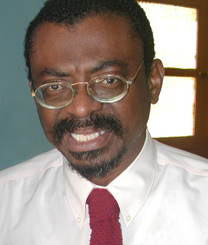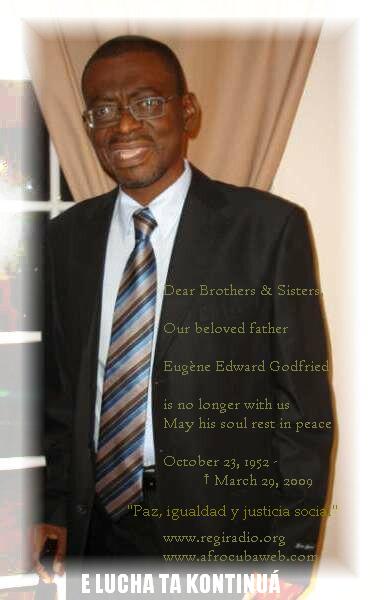|
|
|
Contact: Julia Goldrosen
Host/Producer, Africa Kabisa, WMBR 88.1fm, Cambridge, MA
www.africakabisa.org
africakabisa@hotmail.com
|
Press Release - For Immediate Release
Eugène Edward Godfried
10/23/1952 - 3/29/2009
Caribbean Specialist, Radio Journalist, Community Organizer, Musicologist
Director, Radio Eugene Godfried International
Director, Caribbean Division, Radio Havana Cuba
|
 Eugène Edward Godfried Presilia passed on to the ancestors Sunday morning, March 29, 2009, in Willemstad, Curaçao, his homeland, after suffering a grave stroke March 21st. He was 56. Eugène Edward Godfried Presilia passed on to the ancestors Sunday morning, March 29, 2009, in Willemstad, Curaçao, his homeland, after suffering a grave stroke March 21st. He was 56.
Eugène Godfried was a widely respected and renowned radio journalist, scholar, community organizer, political activist, and ethnomusicologist. For over 30 years, he worked with Caribbean nations to promote ideas and actions regarding popular culture and Caribbean identity. He dedicated his life to researching, articulating, and interpreting cultures of the Caribbean and to fostering Afro-Caribbean pride, and was especially recognized for his expertise on Afro-Cuban music, history, and culture. As a political activist, he fought against colonialism, racism, exploitation, and oppression.
Eugene Godfried’s life and work were of deep importance and impact to the Caribbean region. As James Millete, Professor of African American Studies at Oberlin College, notes:
“The death of Eugene Godfried has closed an important chapter in the political life of the Caribbean in general and the Dutch Caribbean in particular. For more than thirty years the name and the activities of Eugene Godfried had to be reckoned with in the region. As activist, as radical politician, as radio journalist, as researcher and propagandist Eugene articulated a constant message of challenge and change, of hope and transformation, from one end of the Caribbean to the other.
But as militant and radical as he was, Eugene was also very human, very cultured, very sophisticated. He was the quintessential Caribbean man. He was fluent in nearly all the languages of the region - from Papiamentu to Patois to Kreyol to Sranang to French and English and Spanish and Dutch and Portuguese, to name only a few - and willingly interpreted the various cultures in language and in meaning to each other and to all those seriously interested in knowing the real Caribbean.”
Highly learned, but also a man of the people, Eugene Godfried used his role as a radio personality to foster open discussion among a socially diverse listening audience. For Mr. Godfried, broadcasting was a methodology for promoting active dialogue among all social sectors, and a strategic way to defend popular Caribbean identity. His radio programs incorporated not only music, but discussions of a wide scope spiced with Caribbean cultural ingredients. His international interview guests ranged from all strata of society, from the highest political echelons to the voices of common people conveying their lived experiences.
Just as Eugene Godfried viewed the Caribbean as an integrated region, he integrated broadcast journalism with elements of numerous other disciplines including social psychology, cultural anthropology, linguistics, philosophy, political science, economics, agronomy, religion, social geography, history, sociology, musicology, and ethnography. Similarly, he integrated his experience as a community organizer with that of radio journalist, heading directly to both urban and rural areas to conduct fieldwork and record oral history for his scholarly research.
Born in the Caribbean nation of Curaçao in the Dutch Antilles in 1952, Eugene Godfried began his education in Catholic primary schools of his homeland and took his higher degrees in Holland in social services with an emphasis on culture and community organizing. In the 1970s, he became professionally involved with radio, initially in Curaçao. His political mentor, Dr. Cheddi Jagan, who had served as Chief Minister of Guyana and would later become its President, personally encouraged Mr. Godfried to conduct progressive interviews on radio and television. Jagan, who Mr. Godfried deeply respected as a Marxist-Leninist thinker, was also instrumental in bringing Mr. Godfried to the attention of the Cuban government, who asked him to delve into matters of Afro-Cuban culture, music, and politics.
Eugene Godfried first visited Cuba and participated in its radio broadcasts in the 1970s. He also traveled and broadcasted extensively in numerous other Caribbean and Latin American countries. In the 1980s, following political persecution by the governmental regime in Curacao, he decided to establish himself in Cuba. He quickly became a leading voice, and conscience for Afro-Cuban identity, in Cuban broadcasting, where he worked for several decades. His professional work on Cuban radio stations included Radio Taino, Radio Progreso, (where he directed Caribbean programming and collaborated closely with Eduardo Rosillo Heredia), Radio Rebelde, and Radio CMKS-Guantanamo, among others. Since 1995, he directed the Caribbean Desk of Radio Habana Cuba International as a Caribbean Specialist. A talented linguist, Eugene was fluent in thirteen languages. His main broadcast languages included English, Spanish, Papiamentu, French, and Kreyol.
Mr. Godfried first made an appearance on Eduardo Rosillo’s Radio Progreso program, “Un Domingo Con Rosillo” in 1993. He and Mr. Rosillo became increasingly concerned with the “de-Africanization” of Cuban popular music, and the urgent need for survival of the Cuban son rhythm complex, which they viewed as the most authentic representation of Cuban cultural identity. Mr. Godfried feared that the destruction of this musical form would imply a denial of the African component of Cuban society in shaping Cuban national identity.
Through his involvement with Cuban radio stations, Eugene Godfried actively promoted and celebrated the son complex and other aspects of Afro-Cuban identity. (Similarly, Mr. Godfried would strive to restore respect for the African-originated tumba rhythm of Curaçao.) He also researched deeply and spoke openly about the political history of Afro-Cubans, including the 1912 massacre of members of the Partido Independiente de Color (the Independent Colored People’s Party). Although a member of the Cuban Communist Party, Mr. Godfried did not shy from openly criticizing racism within the country. His criticism was accepted at the highest levels, though naturally he made a few unhappy.
Mr. Godfried was also a specialist on celebrations of Carnival as expressed in Caribbean and Latin American nations. He participated in the 1998 world conference on carnival held in Hartford, Connecticut. He was a producer and promoter for the longstanding Cuban group Conjunto Chappottín y sus Estrellas, who were vital to perfecting and popularizing the son complex. Mr. Godfried was responsible for the designation of the group as a National Treasure of the Cuban people. As producer and promoter of the Conjunto throughout the Caribbean, Eugene Godfried was committed to insuring that audiences of the world understand Son as an authentic Cuban cultural creation.
Mr. Godfried was a visiting scholar and guest lecturer at numerous American universities from 1999 - 2007. His lecture topics included issues of race and identity in the Caribbean, as well as popular culture, history, politics, and journalism. His research examined the connections between Africa and the Caribbean, (as well as the world), from anthropological, linguistic, cultural, religious, political, and economic perspectives. Mr. Godfried’s paper, “Reflections on Race and the Status of People of African Descent in Revolutionary Cuba” was presented in 2007 at the Caribbean Studies Association conference in Bahia, Brasil. He was also deeply interested in the US African American community and its civil rights movement. In addition, as a leader of the youth movement Hubentut 70, he was directly responsible for organizing the recognition and celebration of the first rebellion in 1795 of enslaved Africans in Curaçao.
Never one to stay idle, despite ill health, he mastered the art of self broadcasting and set up his own Internet radio, Radio Eugene Godfried International, www.regiradio.org, in 2006. (Notable interviews included a lively conversation with Noam Chomsky.) He also produced many videos on topics of Caribbean identity, culture, music, and history, which can be found at that website. The word “International” was an integral component of his broadcasting service, as Eugene Godfried considered himself a truly international man. His deep humanity and open heart respected, accepted, and embraced people and cultures from around the world.
Earlier in his professional life, Mr. Godfried served a four-year term as president of the farmers’ cooperative of Curaçao. He returned to Curacao at the end of 2007, and to this political mission in the last year of his life, when in recent months he diligently promoted agrarian reform as the Chairman of the Plataforma Agrario Nashonal (PAN). Throughout his life, he worked as an organizer with local communities and labor unions in numerous Caribbean nations.
He is survived by two daughters in Curaçao, Yomini and Nohraya Godfried, a daughter in Oriente, Krisjocelyn Godfried , as well as his aunt Crisma Merien-Presilia in Curaçao who raised him, his father Alwin Godfried, his sisters Alwina and Nathaly, his brothers Egbert, Alwin Jr., and Nathaniel, and his cousins, including Rutger Merien. Funeral services were held Saturday April 4, 2009 at the Church of Steenrijk in Willemstad, Curacao and were attended by over 500 people from around the Caribbean and the world, including political dignitaries from Curaçao, Saint Vincent, and Guyana. He was interred at Janwe Cemetery.
He will be missed sorely, as now is the time when the issues he confronted in such a deep way are coming to the fore and his was an understanding born of hard-earned time in Cuba and elsewhere with people at every level of society.
For more information on Eugene Godfried, including his collection of writings, and testimonials from friends and colleagues, please visit
www.afrocubaweb.com .
--Julia Goldrosen, Host/Producer, Africa Kabisa,
WMBR 88.1FM, Cambridge, MA; africakabisa_AT_hotmail.com
|



